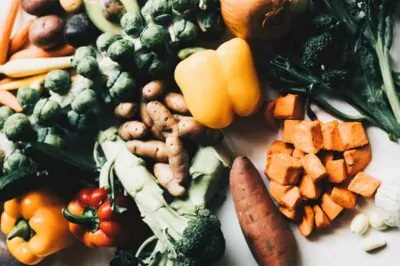You know broccoli is good for you—but on your skin?
Well, we’re not talking about the cruciferous vegetable that you enjoy on your dinner plate, here. Instead, what we use in skin care is the oil produced from broccoli seeds.
Broccoli seed oil is unique because of its powerful antioxidants, and its unique combination of essential fatty acids. Light, non-greasy, and easily absorbed, it’s actually similar in feel to the chemical silicones you’ll find in other skin and hair-care products.
As usual, we’re here to prove that chemicals are not necessary! We can gain the same benefits and much more from natural sources.
Broccoli seed oil is unlike any other, with a unique combination of fatty acids and antioxidants that keep skin looking young.
A Little Bit About the Ingredient Itself
Broccoli seeds produce broccoli sprouts, which are similar to alfalfa sprouts. Broccoli sprouts pack an even more potent nutritional punch, however, as they actually have a lot more more “glucoraphanin” than the florets do. Plus they taste great alone or in salads.
Green sprouting broccoli is believed to have been introduced to the west by Italian immigrants in the 1880s. The plant itself is in the cabbage family, of the species Brassica oleracea. There are a number of varieties, with the most common being “Calabrese broccoli,” named after “Calabria” in Italy. Large flower heads sprout from a thick, edible stalk, and are surrounded by leaves.
Broccoli is also rich in vitamins C and K.
Internal Health Benefits of Broccoli
Though broccoli seeds aren’t normally consumed, broccoli sprouts and florets are. The florets are full of vitamins and minerals and have shown in hundreds of studies to help reduce the risk of cancer by taming inflammation, protecting from oxidative damage, and helping the body flush out waste.
Some studies have also indicated that broccoli may help support the digestive system, both because of its fiber content and because of the phytonutrients that help protect the health of the stomach lining. Scientists are also studying the vegetable’s anti-inflammatory properties to see if they may help to reduce the risk for cardiovascular disease.
Broccoli Seed Oil’s Benefits to the Skin
Broccoli seed oil provides the antioxidant protection of broccoli with the unique moisturization of essential fatty acids. Here’s how the benefits play out on your skin:
- Hydration: Unique essential fatty acids in broccoli seed oil are often used in hair care products because they impart a youthful-looking radiant sheen to hair. On the skin, these same fatty acids provide a greaseless hydration while forming a protective layer that traps in moisture and keeps skin hydrated all day long.
- Protection: As broccoli protects the body, broccoli seed oil also protects the skin environmental stressors.
- Moisturization: Not only do the essential fatty acids in the oil help hydrate skin, but they also deeply penetrate to provide lasting moisturization. Yet this isn’t a pore-clogging oil like mineral oil and other petroleum-based ingredients. Instead, it’s a light, luxurious oil that works equally well on all types of skin.
- Nourishing: Full of vitamin C and other nutrients, broccoli seed oil nourishes the skin and hair, leaving a radiant sheen that looks youthful and glowing.
- Natural source of retinol: Broccoli seed oil supplies natural vitamin A, which can be a natural exfoliator.
- Calming and soothing: Broccoli has another essential fatty acid called “arachidonic acid,” which is the second most abundant polyunsaturated fatty acid in the epidermis. It naturally helps ease and tame the feeling of your skin.
Try It!
All the benefits of broccoli seed oil add up to one thing—anti-aging. We’ve included it in our Anti-Aging Facial Oil. Try it and see if you notice the difference after about four weeks.
What do you think of broccoli seed oil? Please share any tips you may have.








Yes, I use broccoli oil in my skincare routine and also on my hair. It does leave my hair soft and shiny. Thanks for this post!
While broccoli does not have vitamin D, it contains vitamins A and K. In fact, one serving of broccoli provides 245% of the daily recommended amount of vitamin K